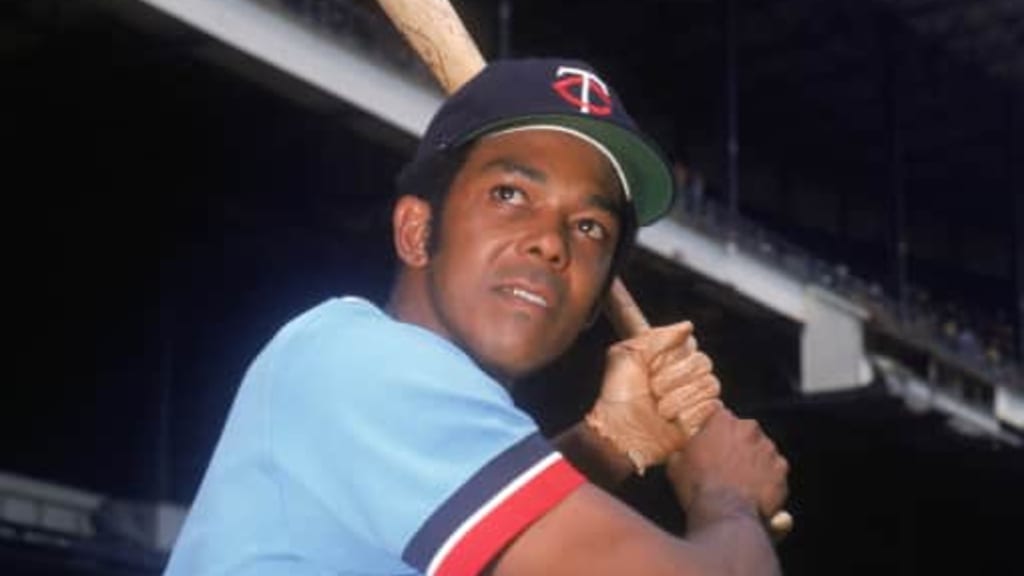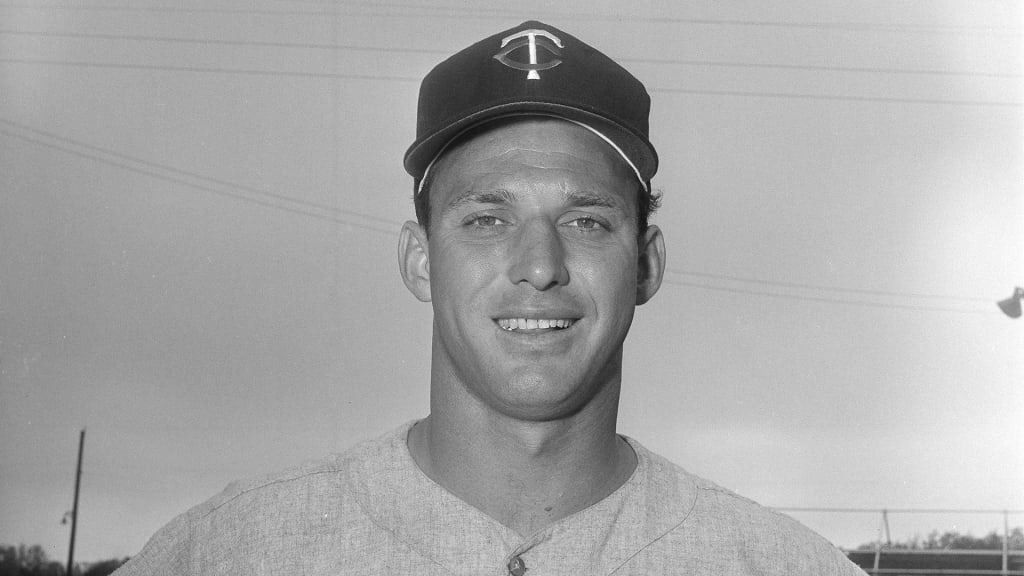
No one loves a good debate quite like baseball fans, and with that in mind, we asked each of our beat reporters to rank the top five players by position in the history of their franchise, based on their career while playing for that club. These rankings are for fun and debate purposes only ... if you don’t agree with the order, participate in the Twitter poll to vote for your favorite at this position.
Here is Do-Hyoung Park's ranking of the top 5 right fielders in Twins history, since the franchise relocated to Minnesota in 1961. Next week: Designated hitters.
1. Tony Oliva, 1962-76
Key fact: Won three batting titles and led the AL in hits five times
One of the most beloved players, coaches and ambassadors in club history, Tony O is the only member of the organization to have been in the dugout for all three American League pennant-winning teams: in 1965 as the right fielder, in '87 as the hitting coach and in '91 as the bench coach. That journey began in earnest with Oliva's remarkable rookie season in '64, when he took control of the starting right-field job and hit .323/.359/.557 with 32 homers, 43 doubles and 12 stolen bases to become the first rookie in Major League history to win a batting title. (He has since been joined by Ichiro Suzuki, who won the batting title and the AL MVP Award in 2001.)
That performance in 1964 was the first in an eight-year stretch in which Oliva flaunted his true five-tool skill set, winning a Gold Glove Award in right field alongside his five 20-plus-homer seasons, seven 30-plus-double seasons and pair of runner-up finishes in AL MVP Award voting. Not only did Oliva win two of his three batting titles in his first two full seasons in the Majors, but he also led the AL in hits in his first three as an all-around threat who played a key role in the club's AL championship in '65. All told, Oliva was an eight-time All-Star in his prime before a right knee injury sustained in '71 commenced a premature downswing in the franchise great's performance.
The introduction of the designated hitter rule in 1973 helped prolong Oliva's 15-year career, but the severe, recurring knee problems prevented him from playing the field at all and sapped his ability at the plate and on the basepaths. Oliva retired after the '76 season with 1,917 hits, 220 home runs -- fourth in Twins history -- and a .304 career batting average, highest ever among players born in Cuba. Since then, his number has been retired, he has been inducted into the Twins Hall of Fame, and he remains an active presence in the organization and a fan favorite.
2. Bob Allison, 1958-60 Senators, '61-70 Twins
Key fact: His career .479 slugging percentage is the highest among Twins right fielders
Another lifelong member of the Twins/Senators organization, Allison had already established himself as a budding star before the franchise's relocation by winning the 1959 AL Rookie of the Year Award. When the Minnesota Twins became a reality in '61, Allison and future Hall of Famer Harmon Killebrew were the two premier power threats in the heart of the lineup. In fact, Allison hit the first home run in Minnesota Twins history when he took Yankees ace Whitey Ford deep at Yankee Stadium in the seventh inning of the club's inaugural game on April 11, 1961, and finished second to Killebrew with 29 homers that season.
Though the longtime right fielder began to move around the field to left, first base and even some center once Oliva burst onto the scene in 1964, Allison remained one of the most consistent power and on-base threats on those early Twins clubs, as he finished his career with a .358 on-base percentage and hit at least 22 homers in seven of the eight seasons immediately following the team's arrival in Minneapolis. All told, Allison was almost certainly undervalued in his prime as only a two-time All-Star in Minnesota, and his 211 homers following relocation rank him sixth in club history.
Allison's impact in Minnesota extended beyond the field following his playing career. Following a diagnosis of ataxia -- one that eventually resulted in an early death -- he and his wife, Betty, helped to found the Bob Allison Ataxia Research Center at the University of Minnesota. The Twins still raise money for research in ataxia and other brain, nerve and muscle disorders in Allison's memory through the club's annual Diamond Awards banquet.

3. Michael Cuddyer, 2001-11
Key fact: Was part of six division-winning teams in Minnesota
Tom Brunansky actually had a higher career WAR with the Twins, but Cuddyer gets the higher place on this list for his longevity with the club, continued stature in the franchise and his important place on those 2000s Twins teams that were consistently in the running for AL Central titles. Cuddyer was the No. 9 overall selection in the 1997 MLB Draft and first surfaced for an eight-game cameo with the Twins in 2001, the first season in an 11-year run with the franchise. He produced seven seasons with double-digit homers before finishing his career with the Rockies and Mets.
Cuddyer had an important place in the heart of the order for many of those Twins teams in the late Metrodome era that won AL Central championships in 2002-04, '06, '09-10. His best season came in '09, when he hit a career-high 32 homers with a .520 slugging percentage as part of the team that won the legendary "Game 163" against the Tigers in the final regular-season home game at the Metrodome. Cuddyer finished his Twins career with 141 homers and a .272/.343/.451 slash line and ranks ninth in club history with 239 doubles. These days, Cuddyer joins former teammates Torii Hunter and Justin Morneau as a special assistant to the team's baseball operations.
4. Tom Brunansky, 1982-88
Key fact: Hit 20 or more homers in all six full seasons with Twins
Cuddyer may have won six division titles with the Twins, but Brunansky actually has a World Series ring as the starting right fielder for the 1987 team that brought home the first championship in club history. Brunansky was durable, powerful and consistent in parts of seven seasons with the Twins and hit at least 20 homers and 21 doubles in every one of those years to finish with 163 long balls in his Twins career (10th in club history). Though he was named to his only All-Star team in '85, his best all-around season probably came for that '87 club. He also was one of its most valuable contributors in the postseason with two homers and a .412/.524/1.000 slash line in the AL Championship Series, and he added five hits in the World Series win over the Cardinals.
5. Max Kepler, 2015-present
Key fact: His 36 homers in 2019 are the most in a season by a Twins right fielder
There's some stiff competition for the final spot in these rankings, but it's looking as though Kepler will have more than earned his place among the other names on this list by the time his Twins career comes to an end in the distant future. Inked to a five-year extension with a club option for a sixth year before the 2019 season, Kepler rewarded the club's faith in him with another big step forward in his plate discipline and power, leading to a career-high 36 homers as the primary leadoff hitter for the "Bomba Squad" that set MLB's all-time single-season home run record. Though he arrived in the organization as a less polished prospect from Germany, Kepler has exhibited a consistently upward trajectory throughout his Major League career and has paired his success at the plate with a strong glove in right field (and center, too, when needed).
Honorable mention
Matt Lawton would have been a worthy choice to beat out Kepler for the final spot on the list. The former 13th-round selection showed off his power and speed in parts of seven seasons with the Twins, culminating in his 2000 campaign in which he collected 13 homers, 44 doubles and 23 stolen bases and earned his only All-Star nod while with the Twins. ... Dan Ford was a consistently above-average hitter with solid pop for Minnesota in a four-year stretch in the 1970s, tallying 57 homers and 106 doubles during some of those lean years in the organization's history.



